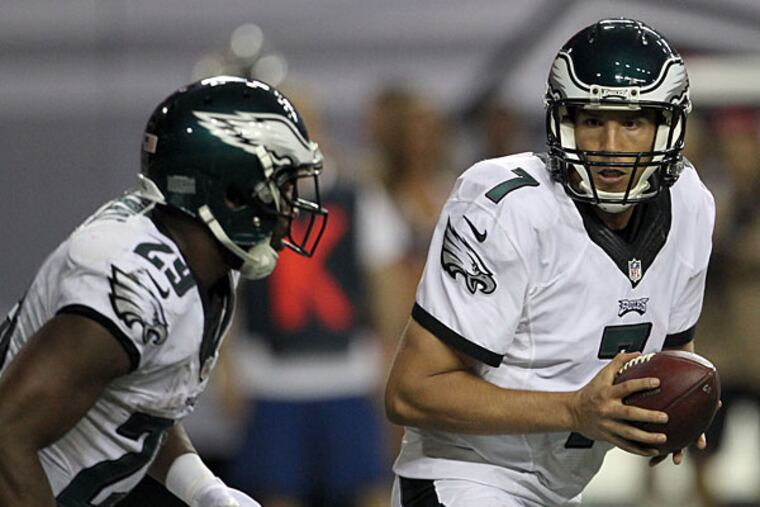New Eagles starters don't change their stripes
Chip Kelly was betting they'd be different, but they aren't.

SO RESOLUTELY does Chip Kelly abhor complexity that if he were editing this piece, he'd already have changed two of the first six words to "much" and "hate" and checked for synonyms on the seventh.
His offense boasts the league's shortest playbook, quickest calls and fewest huddles. Everything builds on a foundation of superior fitness married with simple execution of straightforward plays.
Which sometimes doesn't work.
On Monday night against the Falcons, the Eagles ran an experiment. Were two career backup offensive linemen, the least-heralded member of the Seattle secondary and Sam Bradford all the same guys they had been before - or would they somehow be different while wearing green?
The answer: pretty much the same. And all contributed to an ugly loss that was close only thanks to the red-zone heroics of new linebacker Kiko Alonso, who also looked like the same player he's always been, though in a good way.
Bradford did not play a bad game. He was fearless in the pocket and pushed the offense slowly, painfully down the field with an impressive display of hyperaccurate short-range passing. He looked exactly like the best, least-injured version of his St. Louis self.
The problem is that the St. Louis Sam Bradford never threw the ball down the field either, for which many excuses were made on his behalf. Yes, the teams were bad, he was frequently injured and his offensive coordinator was a Schottenheimer, but Bradford still threw deep passes less often than either his backups in St. Louis or Mark Sanchez in the same offense with the Jets.
On Monday, despite facing an Atlanta defense that spent most of the game with just a single-high safety, Bradford was even less aggressive than he had been in St. Louis. Four out of every five passes he threw traveled no more than 10 yards downfield (whether you count screens in that total or not). Only one pass all night went further than 20 yards in the air.
After the game, Kelly defended Bradford's effort, saying he took what the defense gave him. He'd likely say the same thing about his own playcalling, which is how the Eagles finished with 52 pass attempts and only 16 runs, an imbalance matched only three times in 14 seasons by the unrepentantly pass-happy Andy Reid.
Football offenses don't get more complex at each level because that's more fun for the coaches. All those X's-and-O's are there because when NFL defenses know what's coming, they are pretty good at stopping it. And "taking what the defense gives you" is the football equivalent of letting your power forward shoot three-pointers all day because no one bothers to guard him all the way out there.
There are aspects of the Kelly-era college offenses that remain very difficult to defend. The "packaged plays" that can be a run or a pass depending on the immediate postsnap movement of one defensive player are deadly, which is why seemingly every offense in the league is now running them, including Atlanta.
The core tenets of Kelly's run game are starting to look a little more limited, at least with the offensive line they actually have and not the one fans wish they had drafted. A little more complexity in blocking assignments might give those struggling guards some better angles every once in a while.
Kelly did unveil one new wrinkle in the run game Monday, with the two-puller sweep that breaks the offensive tendency to always run away from the back's original alignment. It also traps inside defenders who are squatting on the inside zone. It's a fun play to watch with a million moving pieces that still isn't quite as effective at solving the same core problem that a mobile quarterback who can keep the football does. Three years into the Kelly era, the Eagles still don't have one of those.
It's a mistake to overreact after the first game. This was a team coming back from a lot of injuries and scraping off a ton of rust. It's easy enough to imagine different results on a handful of plays that could have swung the final result. The best example might have been the missed seam-route pass to Miles Austin that glanced off his hand and should have been a touchdown. Although it's hard not to think back to last year, when Jeremy Maclin earned his free-agency megadeal streaking toward the end zone on that same play.
Kelly has reshaped the entire roster in his image, but especially the skill positions. Gone are the complicated home-run hitters, in are the hard-working lunch-pail guys. Outside of Darren Sproles, there's no one on the roster who is all that electric with the ball in his hands.
With Dallas looming, Kelly needs to find some answers. Reid was great at the midseason course correction. When his offense bogged down or became one-dimensional, he schemed out a Plan B, C and D to fix it. Kelly might have to embrace that same multi-answer complexity to keep his own offense moving.
Of course, then there's defense.